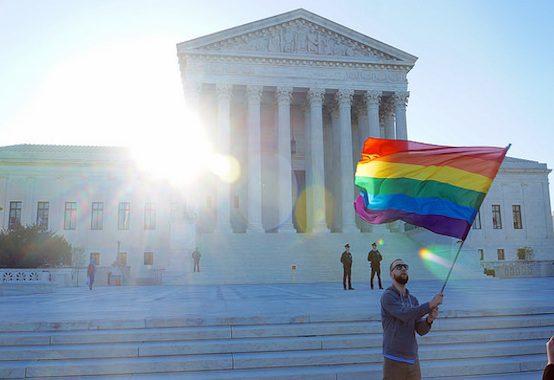Big 7th Circuit Gay Rights Ruling

A federal court made a potentially huge ruling this week:
In an 8-3 ruling, the US Court of Appeals for the Seventh Circuit on Tuesday concluded that federal civil rights law — specifically, the Civil Rights Act of 1964 — protects workers from discrimination based on sexual orientation. So, the court decided, it’s not legal in the US for an employer to discriminate against gay workers — making it the first federal appeals court to conclude that gay people are protected under existing civil rights law.
The argument: Federal civil rights laws prohibit sex discrimination, and this, based on the Seventh Circuit Court’s interpretation of the law, encompasses sexual orientation. “It would require considerable calisthenics to remove the ‘sex’ from ‘sexual orientation.’ The effort to do so has led to confusing and contradictory results,” Chief Judge Diane Wood concluded in the majority opinion.
David French analyzes the decision, and concludes that the federal panel just made up law for the sake of social justice:
There is instead an entire class of federal judges who, when faced with contentious culture-war cases, simply ask, “what can I do for social justice today?” They disrupt the constitutional system, and they don’t even (Judge Posner aside) pay us the courtesy of basic honesty about their intentions and methods. The case will probably proceed to the Supreme Court. There’s a circuit split (in other words, different federal courts of appeal have reached different outcomes), and the ultimate fate of the law is almost certainly in Justice Kennedy’s hands. He has proven that he can understand and apply the original meaning of the law, and he’s also proven — particularly regarding LGBT issues — that he will do whatever he wants to advance a cause he so plainly likes. We can’t know what he’ll do, and thus we can’t know if he’ll hold that the statute means what it so plainly says. That’s not constitutional government; it’s judicial supremacy, and it’s creating a grave and ongoing challenge to the rule of law itself.
In her dissent, Justice Diane Sykes highlighted what a dangerous step this ruling is:
Our role is to… [interpret] the statutory language as a reasonable person would have understood it at the time of enactment. When we assume the power to alter the original public meaning of a statute through the process of interpretation, we assume a power that is not ours. The Constitution assigns the power to make and amend statutory law to the elected representatives of the people. However welcome today’s decision might be as a policy matter, it comes at a great cost to representative self-government.
In other words, the court took it upon itself to say that the law means things the drafters could not have meant. Rather than wait on Congress to change the law, the court changed the meaning of language itself. It is shocking. What democracy!
It is unclear what specific impacts this ruling, if nationalized by SCOTUS, would have on religious liberty within religious institutions. But it cannot be good. The cultural meaning is that this is one more step — a big step — on the road to rendering traditional Christians no better in the public’s imagination than racial segregationists. Get ready.
Subscribe for as little as $5/mo to start commenting on Rod’s blog.